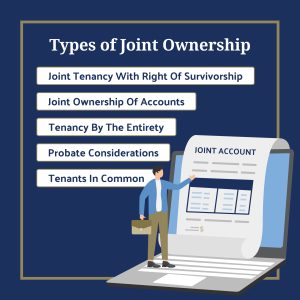Joint ownership is often seen as a simple way to transfer property and avoid the probate process, but it comes with both advantages and potential pitfalls. By adding a co-owner to your Florida real estate, the property may pass directly to them upon your death, bypassing probate.
However, joint ownership can also lead to legal complications, tax consequences, and creditor risks. In this guide, we’ll explore whether joint ownership is an effective real estate planning tool for avoiding probate and how it compares to other estate transfer strategies.
What is Joint Ownership?
Joint ownership refers to a legal arrangement where two or more individuals share property ownership. In Florida, common types of joint ownership include joint tenancy with the right of survivorship, tenancy by the entirety (for married couples), and tenancy in common.
With joint tenancy, the property automatically transfers to the surviving owner upon death, potentially avoiding the probate process. However, joint ownership comes with legal and financial considerations, making it important to evaluate if it’s the right real estate planning tool for your situation. Understanding probate laws is essential when deciding if joint ownership is the best way to pass property to your heirs.
Types of Joint Ownership
When considering joint ownership as part of your real estate planning, it’s important to understand the different ways property can be held. Each type of joint ownership has unique legal and financial implications, affecting how the property is managed and transferred upon death. In the following sections, we’ll explore the main types of joint ownership and how they impact probate, property ownership, and estate planning decisions.
Joint Tenancy with Right of Survivorship (JTWROS)
Joint Tenancy with Right of Survivorship (JTWROS) allows two or more owners to hold property ownership equally. When one owner passes away, their share automatically transfers to the surviving owner(s) without going through the probate process. While this can simplify real estate planning, it also means owners cannot pass their share to heirs through a will or beneficiary deed.
Tenancy by the Entirety
Tenancy by the Entirety is a form of joint ownership available only to married couples in Florida. It provides probate avoidance, automatic transfer of property ownership to the surviving spouse, and protection from certain creditor claims. However, this type of real estate planning is only an option while both spouses are alive and married, as divorce converts ownership into tenancy in common.
Tenants in Common and Probate Considerations
With Tenants in Common, each owner holds a separate, defined share of the property, which can be passed to heirs rather than automatically transferring to co-owners. Unlike JTWROS, a deceased owner’s share must go through the probate process unless a separate estate planning tool, such as a Lady Bird Deed or transfer on death designation, is in place. This structure offers flexibility but may complicate estate settlement, especially if multiple beneficiaries are involved.
Joint Ownership of Bank and Investment Accounts
Joint ownership extends beyond Florida real estate and applies to bank and investment accounts. Accounts held as joint tenants with right of survivorship (JTWROS) or payable on death (POD) accounts allow funds to transfer to the surviving owner or named beneficiary without probate. However, joint accounts may be subject to creditor claims or unintended access by co-owners, making careful estate planning essential.
What are the Advantages of Joint Ownership?
Joint ownership is a popular real estate planning strategy because it offers several benefits, including avoiding probate, simplifying property transfer, and providing financial security for co-owners. Depending on the type of joint ownership, it can also offer creditor protection and tax advantages. In the following sections, we’ll explore the key benefits of joint ownership and how it can impact your estate planning decisions.
Avoiding Probate
One of the biggest advantages of joint ownership is that it allows assets to pass directly to the surviving owner(s) without going through the probate process. This can save time, legal fees, and administrative burdens for heirs. Unlike other real estate planning tools, joint tenancy with right of survivorship (JTWROS) and tenancy by the entirety provide an automatic transfer of property ownership upon death.
 Immediate Access to Assets
Immediate Access to Assets
With joint ownership, the surviving owner(s) can immediately access the property or financial accounts without waiting for court approval. This is particularly beneficial for bank and investment accounts, ensuring that a surviving spouse or co-owner can continue paying bills and managing finances without delays caused by the probate process.
Simplifies Estate Planning
For individuals looking for a straightforward estate planning solution, joint ownership simplifies the transfer on death process. By naming a co-owner, assets automatically pass to them, reducing the need for complex legal arrangements like trusts. This approach works well for those seeking an easy way to transfer property ownership to a spouse or close family member.
Provides Some Protection from Creditors
Certain forms of joint ownership, such as tenancy by the entirety for married couples, offer creditor protection in Florida. If one spouse is sued or has outstanding debts, creditors generally cannot seize jointly owned Florida real estate. However, this protection does not apply to joint tenancy with right of survivorship (JTWROS) or tenants in common arrangements.
Less Costly and Easier to Set Up Than a Trust
Compared to setting up a trust, joint ownership is a simpler and more affordable way to manage real estate planning and asset distribution. While trusts provide greater control over assets, they require legal documents, ongoing management, and sometimes court involvement. Joint ownership offers a cost-effective alternative for individuals who want to avoid probate without the expense of formal trust administration.
When Joint Ownership May Not Be the Best Option
While joint ownership can be a useful real estate planning tool, it is not always the best choice for every situation. In some cases, it can lead to complications, limit flexibility, or create unintended consequences. Before adding a co-owner to your property or financial accounts, consider these potential drawbacks to ensure it aligns with your estate planning goals.
When You Have Multiple Beneficiaries
If you plan to leave assets to multiple beneficiaries, joint ownership can create complications. Since property or accounts automatically transfer to the surviving owner, other heirs may be unintentionally disinherited. Unlike a trust or beneficiary deed, joint tenancy does not allow you to divide assets among multiple individuals, making it less effective for estate planning with several heirs.
When Medicaid Planning Is a Concern
For those considering Medicaid planning, joint ownership may not be the best option. Adding a co-owner could affect Medicaid eligibility, as the state may count the jointly owned asset when determining benefits. Additionally, if the property is solely in the applicant’s name, certain Medicaid planning strategies, like a Lady Bird Deed, may better protect assets from Medicaid estate recovery.
When You Want to Retain Full Control Over Your Assets
With joint ownership, all co-owners have legal rights to the property or account, meaning decisions must be made together. If you wish to sell, refinance, or modify ownership, you may need the consent of the other owner(s). For those who want to maintain full control over their assets, alternative estate planning tools, such as trusts or a transfer on death deed, may be more suitable.
Alternatives to Joint Ownership for Avoiding Probate
While joint ownership can help bypass the probate process, it is not always the best estate planning strategy. Fortunately, there are several alternatives that allow you to retain control over your assets while ensuring a smooth transfer to beneficiaries. Below are some of the most effective ways to avoid probate while maintaining flexibility and asset protection.
Revocable Living Trusts
A revocable living trust allows you to transfer assets into a trust while maintaining control during your lifetime. Upon your passing, assets are distributed to beneficiaries without going through probate. Unlike joint ownership, a trust offers greater flexibility, privacy, and the ability to provide for multiple heirs while avoiding potential legal conflicts.
Transfer on Death (TOD) and Payable on Death (POD) Accounts
Transfer on Death (TOD) and Payable on Death (POD) accounts allow you to name beneficiaries who will automatically receive funds upon your passing. These designations work for bank accounts, investment accounts, and securities, making them a simple way to avoid probate. Unlike joint ownership, TOD and POD accounts do not grant the beneficiary access to the funds during your lifetime.
Lady Bird Deeds for Real Estate
A Lady Bird Deed, also known as an enhanced life estate deed, allows Florida homeowners to retain full property ownership while naming beneficiaries to inherit the property upon their passing. This real estate planning tool avoids probate, provides Medicaid planning benefits, and allows the owner to sell or refinance without beneficiary approval, unlike joint tenancy or traditional life estate deeds.
Beneficiary Designations on Retirement and Insurance Accounts
Many retirement accounts and life insurance policies allow you to name beneficiaries for direct asset transfer upon death. Beneficiary designations override a will and ensure that funds pass to the intended heirs without going through probate. Keeping these designations updated is essential to prevent unintended distributions or conflicts among multiple heirs.
Gifting Assets During Your Lifetime
Transferring assets while you are alive can reduce the size of your estate and help beneficiaries avoid probate. The IRS allows tax-free gifts up to a certain amount each year, making this a strategic way to pass wealth to heirs. Unlike joint ownership, gifting gives full control of the asset to the recipient, which may or may not align with your long-term estate planning goals.
Schedule a Consultation With an Estate Planning Attorney
Planning for the future requires careful consideration of the best strategies to protect your assets and ensure a smooth transfer to your beneficiaries. While joint ownership can be a useful tool for avoiding the probate process, it is not always the best option. Alternatives such as revocable living trusts, Lady Bird Deeds, and beneficiary designations may offer greater flexibility and protection for your estate.
To determine the best real estate planning approach for your specific needs, consulting experienced Orlando estate planning attorneys is essential. Our attorneys can help you navigate your options, avoid common pitfalls, and create a tailored plan that aligns with your long-term goals. If you’re ready to take the next step in securing your legacy, contact us today to learn more about our estate planning services and schedule a consultation.


 Immediate Access to Assets
Immediate Access to Assets